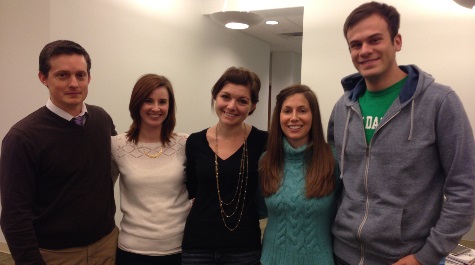Counseling Research Team awarded grant
 In December 2013, a student research team was awarded a grant from the Council for Accreditation of Counseling and Related Educational Programs (CACREP) for their research project entitled Effects of Changing to a 60-Credit Hour School Counseling Program on Admissions Quality, Admissions Diversity, and Job Placement Rates. Students will examine data related to admissions quality, admissions quantity, and alumni job placements rates. The team is comprised of two Ph.D. counselor education students (Benjamin Newman and Clare Merlin) and three Master’s counseling students (Amanda George, Tim Pagano, and Cassie Zanone). Over the next five months, the team will collect and analyze data from CACREP-accredited school counseling programs that have a minimum credit-hour requirement of 60 credits or higher. This project is particularly timely because the minimum requirement is expected to become a CACREP standard requirement in 2016.
In December 2013, a student research team was awarded a grant from the Council for Accreditation of Counseling and Related Educational Programs (CACREP) for their research project entitled Effects of Changing to a 60-Credit Hour School Counseling Program on Admissions Quality, Admissions Diversity, and Job Placement Rates. Students will examine data related to admissions quality, admissions quantity, and alumni job placements rates. The team is comprised of two Ph.D. counselor education students (Benjamin Newman and Clare Merlin) and three Master’s counseling students (Amanda George, Tim Pagano, and Cassie Zanone). Over the next five months, the team will collect and analyze data from CACREP-accredited school counseling programs that have a minimum credit-hour requirement of 60 credits or higher. This project is particularly timely because the minimum requirement is expected to become a CACREP standard requirement in 2016.
The format of a counseling research team composed of both Master’s and Ph.D. students originated in 2008 when current Ph.D. student Ben Newman participated on a similar research team as a Master’s student at William & Mary. Given that successful research experience, Ben organized students at William & Mary to form a new research team in the fall of 2013 to collaboratively conduct research. “I had such a positive experience learning from the Ph.D. students that were on my research team when I was a Master’s student that I wanted to create the same experience for our current Master’s students,” Ben said.
The current research team is excited about the progress they are making on their study, as well as the learning process they are engaged in. “This research experience has felt valuable in multiple ways,” Tim Pagano stated. “For example, I recently attended a round of Ph.D. interviews, and my experiences on this research team drew a lot of interest from professors. The topic is a timely one that hopefully will lead to informative results”. The team is currently meeting weekly to carry out its research and hopes to submit its findings for publication in a peer-reviewed journal by June 2014.